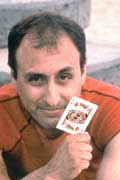“Look, it’s San Andreas Fault. It runs right under the highway and out through the bay.”
Tania Cho was speeding down the Shoreline Highway, pointing right, across the dashboard, toward Tomales Bay. The top was down in her convertible, so she raised her voice to be heard.
Her boyfriend, John Laughlin, looked over to where she was pointing. He didn’t see anything that looked like a quake fault. He saw bushes that mostly blocked his view of the bay. A few eucalyptus trees. Salt marsh. Things you see all over California.
But as he looked he tried to think of how he should respond. He didn’t like having to yell or strain to hear. He didn’t have much interest in talking at all. But he knew he had to say something.
“It’s not San Andreas’ fault,” he said at last. “It’s nobody’s fault.”
“What?” Tania yelled back. “Nobody’s what?” She was smiling, enjoying the drive.
He instantly regretted saying it. Now he’d have to explain. He too often had to explain himself to her.
“Oh,” she said, getting it. “Nobody’s fault? Silly! San Andreas didn’t discover it. Andrew Lawson did. He named it after a sag pond off the 280.”
John nodded, clenching his teeth. He was born in California. He knew earthquakes, and he sure as hell knew about the San Andreas fault.
Tania stopped smiling, sensing his mood. She wanted to talk geology; show him how Point Reyes Peninsula, right across the bay from where they were driving, has traveled hundreds of miles north over millions of years because it sits on a different plate from the one they were driving on. Instead she focused on the road. The silence worked on John’s nerves. Finally, he couldn’t take the tension anymore.
“Look, I was trying to make a joke. San Andreas’ fault; possessive, not nominative.”
“Adjectival,” Tania said. Then she added, “Is that it?”
He nodded. “Ya, it was just a bad joke.”
“Bullshit.”
John rubbed his hands on his thighs, scratched his forehead. Four hundred miles to go before they got back to Pasadena. Bad time to start a fight. But she was a prosecutor. He knew she wouldn’t let it go.
He started quietly. “I meant it as a pun. But now that I think about it, it’s actually a good analogy. Two plates touch each other here at the fault, right? One’s moving north. Most of the time it moves along with no problem, but occasionally there’s a hang up, then an earthquake, and all hell breaks loose. It’s not the fault’s fault, so to speak.”
She stayed quiet, so he continued.
“It’s like us. We’re going in different directions. It’s not anyone’s fault, per se, but occasionally it causes problems. Like this.”
Tania’s jaw dropped.
“People are not rocks, John. Relationships are not ruled by plate tectonics. You decide and you act, or cause a result by choosing not to act.”
He sighed. “I just think our relationship should flow more easily.”
Tania paused, angry, but not wanting to drive him too far into himself. “Nothing flows, John. Everything takes work. You’re burned out. You’re taking a break from your career, and that’s good. But don’t confuse me with jour job.”
She looked over and saw he was listening.
“You think things flow because they do for you. You walked into your old firm in a suit and tie and fit right in from day one. You get invited to the Jonathan Club by your managing partner. I get asked out for sushi.”
Her mention of sushi made John think about when they met. His law firm represented a bank against one of its customers, a businessman who it turned out was running a Ponzi scheme. When he defaulted on a loan, the bank sued him; but the state was prosecuting him first. The partner John worked under sent him over to talk to the prosecutor, a Ms. Tania Cho, to learn what he could about her case.
From the start she was all business. He liked that about her. As he was leaving, he said, “You’re a straight shooter, Tania.”
She said, “I don’t have time to play games, Mr. Laughlin.”
He made an excuse to meet again. After, he invited her out for sushi. He smiled now at his own awkwardness. He wondered how many other ways he sold her short, how little effort he put into finding out who she really was.
He looked over at her now and realized he hadn’t really looked directly at her all day. Realizing he was blocking her out. Realizing that was stupid.
He reached over and placed his hand on top of hers. She turned hers over and their fingers intertwined. She smiled at him.
He looked past Tania to the hills.
“What are those called again? The outcroppings?”
“Bluechist Knockers.”
“Really?”
“Yes, really.”
“Shouldn’t they come in pairs?”
“They’re part of the Franciscan Complex.”
“Sounds like a Catholic sex disorder.”
“And Point Reyes is all granite,” she said, nodding to the right. “Salinian Block.”
“I’m sure there’s a salacious pun in there somewhere.”
“And we haven’t even talked about subduction yet. Or the Cascadia Megathrust.”
“Wow, geological porn. Who knew?”
“Is it getting you hard?”
He rolled his eyes.
They slowed as they entered Point Reyes Station.
“You really love this stuff, don’t you?” he said.
“I think it’s fascinating. I thought I would be a geologist when I grew up.”
“Why did you change your mind?”
“Because people are a lot more interesting than rocks.”
“A lot more difficult.”
“Yes. But people can change, grow.”
Tania pulled over in front of a bakery and stopped. She turned off the car and looked straight into John’s eyes, smiling now.
“Even you.”
© Copyright 2010 Scott Alumbaugh All rights reserved.
Scott Alumbaugh is a web/graphics/print designer. A sailor and an avid cyclist, he formerly wrote a monthly feature (“Sailing Adventures”) for Bay Crossings, and has written extended articles online about his experiences in the Gold Rush Randonnée (a 750-mile, 90-hour event) and other ultra-distance events. Scott lives in Davis, California with his wife, Lisa, and their son, Kazu.
 John Pagliassotti born and raised in the San Gabriel Valley, and now lives in Newport Beach, California. He is married and has two sons in their teens. He works in the commercial real estate industry. One of his hobbies is writing short stories.
John Pagliassotti born and raised in the San Gabriel Valley, and now lives in Newport Beach, California. He is married and has two sons in their teens. He works in the commercial real estate industry. One of his hobbies is writing short stories.












